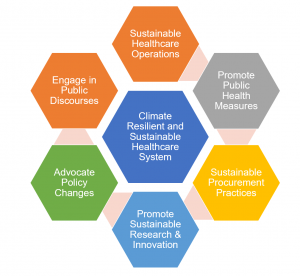How could the healthcare sector respond to global climate and sustainability goals? An Opinion

Dr. Fatma AL JABRI
As it happens, we all tend to be so engaged with our areas of expertise. And that’s important and understandable. We nevertheless need to time-to-time step back and reflect on the broader mission and responsibility of the healthcare system. In this opinion, I intend to cascade the reflection I have recently made on how the healthcare sector could (or rather should) respond to the global climate and sustainability goals.
I believe that the healthcare sector has a crucial role to play in responding to global climate and sustainability goals (THE 17 GOALS | Sustainable Development (un.org)). As one of the largest industries worldwide, healthcare has a significant environmental impact, including greenhouse gas emissions, energy consumption, waste generation, and the use of harmful chemicals. I think therefore that it is just imperative for the sector to take proactive measures to mitigate its negative effects on the environment and contribute to a sustainable future.
One key aspect of the healthcare sector’s response should be to prioritize environmental sustainability in its operations (Sustainability in Health Care | Annual Review of Environment and Resources (annualreviews.org), Environmental health and strengthening resilience to pandemics (oecd.org)). This can be achieved through various means, such as adopting energy-efficient technologies, optimizing water usage, implementing waste management strategies, and reducing the use of hazardous substances. By investing in sustainable infrastructure and practices, healthcare facilities can significantly decrease their ecological footprint and promote resource efficiency.
I also think that another crucial area for the healthcare sector to focus on is to promote public health measures that are aligned with climate goals (WHO Global Strategy on Health, Environment and Climate Change, 2020). Climate change poses significant risks to public health, including increased heat-related illnesses, vector-borne diseases, and respiratory ailments. Healthcare professionals and organizations can play a vital role in educating the public about these risks and promoting preventive measures. They can collaborate with policymakers and advocate for policies that prioritize public health and address climate change simultaneously.
One area that may be quite impactful is to have healthcare providers integrate sustainability principles into their procurement practices (Climate change and global health: What actions are healthcare leaders taking? | World Economic Forum (weforum.org)). By favoring environmentally friendly products and services, they can support the development and adoption of sustainable technologies and practices across the healthcare supply chain. This approach can incentivize suppliers to adopt eco-friendly manufacturing processes, reduce waste, and limit the use of harmful chemicals.
And specifically related to universities and research institutions (such as glory UEF!), the healthcare sector can contribute to global climate and sustainability goals by actively participating in research and innovation. This includes supporting and conducting studies on the health impacts of climate change, exploring new treatments and technologies that are environmentally sustainable, and sharing best practices and knowledge across the industry. Collaboration between healthcare providers, researchers, and policymakers can drive innovation and lead to the development of sustainable solutions that benefit both the environment and public health.
Lastly, healthcare professionals can play a critical role in advocating for policy changes and engaging in public discourse on climate and sustainability issues (Climate change and global health: What actions are healthcare leaders taking? | World Economic Forum (weforum.org)). By leveraging their expertise and credibility, they can raise awareness about the links between climate change and health, and advocate for policies that prioritize sustainability. This can include supporting renewable energy initiatives, promoting sustainable transportation options, and advocating for policies that mitigate environmental pollution.
So overall I am in the opinion that the healthcare sector has the potential to significantly contribute to global climate and sustainability goals. By prioritizing sustainability in its operations, promoting public health measures aligned with climate goals, integrating sustainability into procurement practices, fostering research and innovation, and engaging in advocacy, the sector can become a powerful force for positive change. Embracing a sustainable approach will not only reduce the sector’s ecological footprint but also protect public health and contribute to a healthier and more sustainable future for all.

Fatma Al Jabri – UEFConnect
Department of Nursing Science
University of Eastern Finland
Clinical Nurse Coordinator for the Ministry of Health, Oman